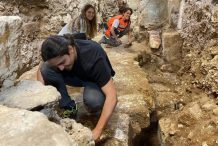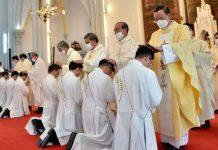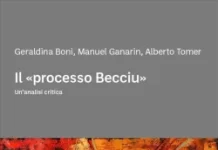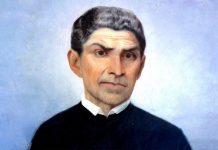Rome (Friday, December 28, 2018, Gaudium Press) Here is a Zenit working translation of the Homily that the Vatican Secretary of State, H.E. Cardinal Pietro Parolin, gave Dec. 21, 2018, in the course of his visit to the Bambino Gesu Paediatric Hospital of Rome.
Homily of the Secretary of State
Dear Brothers and Sisters,
I make my own the lively sentiment of exultance present in today’s liturgy, which we shared in the prayer of the Responsorial Psalm, repeating many times: “Exult , o just, in the Lord; sing to Him a new song,” to express my joy of being here today with you to celebrate this Eucharist in such a particular time of the year, as is the proximity of the great feast of the birth of the Lord Jesus.
First of all, I want to greet the little and young patients, who are present here and all those that, because of their condition of health, cannot be here, wishing that they will be able to return home soonest fully recovered. I also greet warmly all the families that accompany them anxiously, in the hope of the positive success of the therapies underway and meanwhile support them with their care and affection.
A grateful greeting goes to all the medical sand nursing staff, and to the various health professionals that collaborate together to offer every day with commitment, competence and humanity the best possible care to those entrusted to their care. I greet, then, the women religious, who work side by side with the health personnel, and the volunteers who dedicate themselves generously to make the hospital environment more familial, and the Chaplains who with their pastoral charity contribute to make this place an evangelical healing community, with the Lord Jesus at the center, Doctor of bodies and souls, present in our midst also today, to benefit all those who are in any sort of need.
Finally, together with all those gathered here for the occasion, I greet all the administrative staff, the Council of Administration and the Lady President, Dr Mariella Enoc, whom I thank, in addition to the invitation to preside over this Eucharist, for the commitment to manage the Pope Hospital combining the apostolic and humanitarian ends with the health and organizational complex of a modern hospital institution, as the Bambino Gesu is today.
The joy that echoes in the liturgy, which I referred to a short while ago, reminds us that we are now at the end of Advent, season in which the Church prepares to celebrate the great event of the Incarnation, one of the principal mysteries of the Christian faith.
The meeting between Mary and Elizabeth, traditionally known as “The Visitation” – which we just heard in the Gospel – enables us to enter this mystery with humility and simplicity, to be profoundly involved in it. In Saint Luke’s account, this episode is the meeting point of Saint John the Baptist’ story and that of Jesus. The former is the “Precursor,” who prepares the people for the coming of the Messiah; the latter is the One Sent by God, He who “is mightier ” than the prophet himself, who will baptize “with the Holy Spirit and with fire,” the Saviour of humanity.
After the announcement received from the Archangel Gabriel, Mary goes “in haste” to meet Elizabeth, although there were still three months to go before the birth of the Baptist. The Holy Virgin’s solicitude, therefore, was not due to contingent reasons, but what She was living in that particular moment is revealed. In fact, in her spirit different feeling overlap and are intertwined, such as the emotion of holy fear given the extraordinariness of the event in which She is involved, the joy over the realization of the messianic promises and the faith with which She abandoned herself to God.
In her condition, Mary faces this long and difficult journey from distant Nazareth, in Galilee, to Aim Karim, a small village of Judea, south of Jerusalem, to witness in person the sign that the Archangel Gabriel had pointed out to her: “And behold, your kinswoman Elizabeth in her old age has also conceived a son; and this is the sixth month with her who was called barren. For with God nothing will be impossible” (Luke 1:36).
Elizabeth’s maternity is the confirmation that that God is operating in Her, the tested proof of being the one “full of grace” (Luke 1:28) and the one “blessed among all women” (Luke 1:42) to become the Mother of the Saviour.
The meeting is transformed into a Pentecost “ante litteram”. The protagonist is, in fact, the Holy Spirit, who in a virtuous circle through Mary’s greeting is shared first with little John, who “exults with joy” in the maternal womb, and then with Elizabeth who prophesies: “And why is this granted to me, that the Mother of my Lord should come to me?” It is she, in fact, who under the action of the Spirit, has us know the true and authentic meaning of all that was being silently fulfilled from the moment of the Annunciation and after: Mary is the one “blessed among women,” because “the fruit of her womb” is “my Lord.” After John’s exultance, who shares his prophetic charism of Precursor with mother, in the end the Spirit returns to Mary, who magnifies God as her “Saviour, because He has regarded the low estate of His handmaiden,” and for what this look, addressed to His humble handmaiden, will mean for the whole world, in every moment of history.
Mary also comes to us today to bring us the Saviour. And Saint Elizabeth’s astonishment becomes our astonishment” “And why is this granted to me, that the Mother of my Lord should come to me?” Mary accompanies us in the same way to the cave of Bethlehem where, with our wonder, she will put Jesus, the Son of God, in our arms.
Behold how and where our Advent journey ends. See what it means to “prepare ourselves for Christmas,” to be ready to receive the Saviour in our arms, overcome by the love of the maternal and immaculate heart of Mary. Let us allow ourselves to be taken by the hand of the humble “handmaiden of the Lord.” She will certainly lead us to Him who is our Saviour.
These reflections of mine are not a giving in to the rampant do-goodery of these days, and much less so an impromptu promotion of the feast of good feelings of those who prefer to conform to those who want to avoid the danger of being constrained to faith, in face of the mystery we are going to celebrate.
Through these images full of tenderness and astonishment, I intend to focus my and your attention on what I consider to be the only possible attitude with which to prepare for Christmas, now at the doors: Mary’s humble and trusting abandonment to the Will of God.
It is an exemplary and fundamental attitude for every Christian, and all the more important and necessary also for all those that have chosen the profession of care and assistance to the sick, to avoid their commitment becoming a mere technical exercise, to subtract themselves from the uncomfortable ethical and spiritual responsibilities and, more generally, of the human meaning of their action.
I say it especially for you, operators of this Hospital in which, along with the scientific and technical excellence with which you spend yourselves every day for your little patients, for which I express great gratitude, beyond your personal beliefs, you must have present that your work is a not secondary expression of the mercy and charity of the Holy Father and, therefore, of his apostolic ministry itself.
Therefore, I hope you will allow yourselves be infected by the joy of Christmas, not so much as a momentary evasion of the weight and drabness of the everyday but, as Saint Paul VI reminds us in the Apostolic Exhortation Gaudete in Domino, as a sign of our progressive transfiguration in the image and likeness of the “new Adam: (Cf. 1 Corinthians 15:45), whose birth we are preparing to celebrate. In fact, in the document the Holy Pontiff says: “The joy of God knocks at the door of the physical and moral sufferings of the sick, not, certainly to deride them, but to carry out their paradoxical work of transfiguration” (paragraph V). May it be so for all. To the little and young patients and to their families I bring the good wishes of the Holy Father Francis, as he expressed them in last Wednesday’s General Audience: “Dear brothers and sisters, I wish you a happy Christmas, a Christmas rich of Jesus’ surprises! (Sometimes) they might seem uncomfortable surprises but they are of the just of God. If we espouse them, we will give ourselves a splendid surprise. Each one of us has, hidden in his heart, the capacity to be surprised. Let us allow ourselves to be surprised by Jesus this Christmas, because, in any case, Jesus’ surprises are always full of His love and of that hope that doesn’t disappoint (Cf. Romans 5:5).]
So be it.
Source Zenit

































